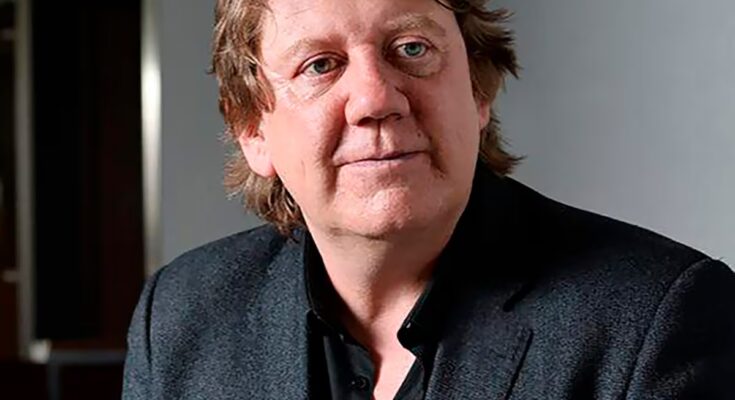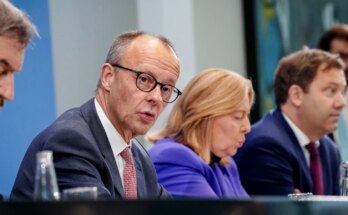Paul Hardy (Brighton, 52) spent the first two decades of the 2000s looking for everything to make life easier for him and his colleagues. Perhaps it was the drive to always find the simplest way of doing things that made it a point of reference for digitalisation. ServiceNow, a company he has dedicated the last 10 years to, provides tools to create digital environments for governments and large companies, such as Microsoft, Veolia or the Formula 1 team Aston Martin.
An avowed surfing enthusiast, he spends his days dealing with the challenges of a world of companies that have become obsessed with artificial intelligence (AI) too quickly. Hardy says customers praise this technology without having any idea where they’re going, and that in his current job it often serves as a lifeline to keep executives from continuing to blow up millions without rhyme or reason. Recently, his company has become a pioneer in the development of business AI agents, a tool that promises to transform work as we know it. In an interview with EL PAÍS, the executive comments that, like electricity or the internal combustion engine, artificial intelligence will destroy jobs. However, he believes that from this revolution a new era will emerge, with new horizons that humanity has yet to discover.
Ask: What does innovation mean to you?
Answer: Technology is changing dramatically and innovation is simply doing something different tomorrow. For a large organization, it could mean optimizing a single process and changing the way it does business.
Q: In the current environment of technological advances, what do you find particularly exciting or disruptive?
A: The idea of technology that works exactly when people need it seems crucial to me. One of the greatest successes in the world is that people carry a phone with them and can install applications if they work for them or uninstall them if they don’t like them. In the business environment, technology must work the same way. We have always had tools that, more or less, worked well. But we are now certainly close to a position where new technologies such as artificial intelligence and platforms will be able to do exactly what is required. We are adapting them to do what they need to do at the exact moment, generating value.
Q: You just mentioned artificial intelligence. Do you think companies need to strike a balance between technology and human capital?
A: We need to learn how to use the tools correctly and get employees to explore the possibilities they offer. Humans are critical to business and we will continue to be, but we need to think about how. There are some basic tasks that none of us want to do. People make mistakes or get bored and then want to avoid them. So why can’t we automate them? This would allow people to spend time developing ideas that can truly create value. Part of what we do is streamline and simplify so people can see if they’re spending time on things they find meaningful or important. Some of the companies we work with are so large that they have lost touch with people.
Q: We are increasingly talking about AI agents. How do you think the landscape will change in the coming years?
A: I think they will affect everything in our daily lives. As I said before, I think these technologies will help us with everything we don’t want to do. They will enable people to do things better, to engage in innovation and imagination. There are many aspects of the job that an AI agent should be able to do better than a person. Will this affect jobs and roles? Obviously. But just like when the train came and people drove horses and carriages, over time these people will be retrained into different roles and jobs. This is a revolution, but in the meantime I think the roles that will suffer will be the ones that people won’t want to fill anyway.
Humans are critical to business and we will continue to be, but we need to think about how
Q: What do you think humans will do once AI takes care of everything we don’t want to do?
A: We will be able to grow and do more. This is the vision. We will be able to think about the environment, the planet, the communities in which we operate. Many of these things get relegated to the background because we focus on a product or outcome. I think this will give us the freedom to think more about how we can have a bigger impact in the future.
Q: There is currently an ongoing debate on competitiveness in Europe.
A: YES. I think there are many solutions. Innovation is a tool to be competitive, but we need to have a strategic approach. There are many technologies, but in Europe we must first understand and solve problems, not simply automate them. Otherwise we give the advantage to the opponent. In the case of the automotive industry, for example, a manufacturer is no longer just a manufacturer, but is a digital company. Now that electrification is coming, we need to figure out how to allow these traditional businesses to continue to develop. Obviously we won’t completely transform them, but removing some of the noise can help them grow and achieve their goals.
Q: What barriers do you find to the adoption of these innovative technologies in the private sector?
A: I think the biggest challenge is for people to understand that each case has its own particularities. Everything was very fast. ChatGPT appeared and people panicked. The bosses began to force people to search for anything so as not to be left behind. They wanted to appear as leaders in this segment. Now people relax. They are thinking about how to develop a real AI strategy.
Q: When so many companies use the word AI superficially, how can you recognize its real value?
A: The simple answer is through your AI strategy. A true AI strategy doesn’t focus on the AI itself. It’s about value for the company and that’s the key. Many organizations believe that AI is limited to the IT department, but this is not the case. It is a business tool capable of radically transforming the way companies think, act and carry out their activities, generating value in the future.
Q: With all the information that is currently being generated, how can you distinguish what is important from what is useless?
A: With machine learning models and long language models we are close to AI being able to do this on its own. It is clear that not all data will be perfect. We have to start with what we know works, with what we have faith in. It is important to analyze the data we connect with, understand what it is and where its value lies. However, in the very near future, our systems will understand which data is invalid and will learn to ignore it.
Q: In a world governed by information, is it possible to find a balance between data and human intuition?
A: Risk is becoming an everyday issue. You need to know how to evaluate so as not to make random decisions. In this sense, when we see information, we are controlling risks and seeking balance. Platforms and data serve this purpose, to make informed decisions. In today’s world, with a competitive market and climate change, people and companies need to improvise or diversify, do things differently. Risk is part of life and business, but data emerges as an opportunity for people to understand the situation and decide what risks they want to take.
Q: Do you expect quantum computing to change the current landscape?
A: We are doing a lot of research on the topic. Indeed, in the Innovation department, we have spent a lot of time over the last six to eight months investigating where quantum computing could add value. Potentially, it would be about safety, speed, pace and speed with which you can work. Also in the exponential growth of data and their understanding, which allows us to make more informed decisions.
Trends It is a project of EL PAÍS, with which the newspaper aspires to open a permanent dialogue on the great future challenges that our society must face. The initiative is sponsored by Abertis, Enagás, EY, Iberdrola, Iberia, Mapfre, Novartis, the Organization of Ibero-American States (OEI), Redeia and Santander, WPP Media and strategic partner Oliver Wyman.
You can sign up Here to receive the weekly newsletter of EL PAÍS Tendencias, every Tuesday, from journalist Javier Sampedro.



